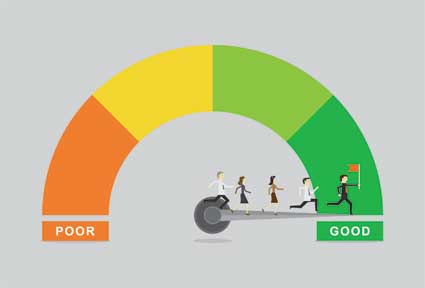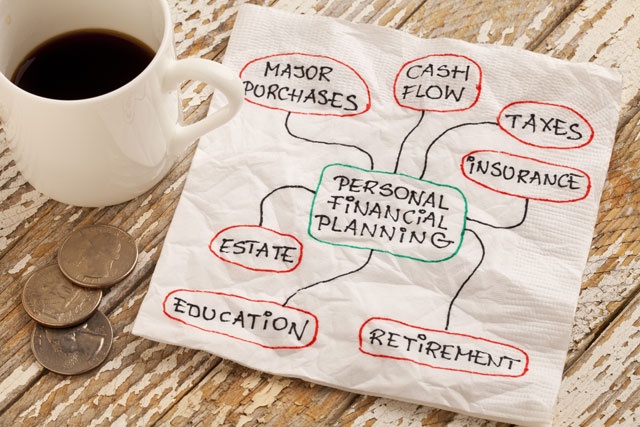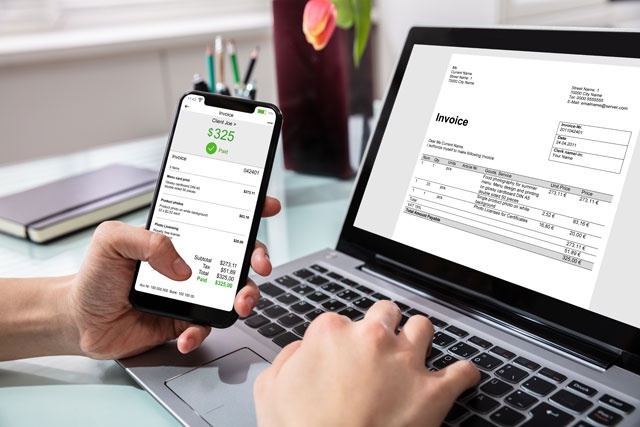Say you're on a cross-country drive. The goal is to get from New York to Los Angeles. You pack up your trusty car, hop in, and head west to begin your trip. What's wrong with this picture?
Ah, the map, perhaps a weather report, and what about accommodations once you arrive? These elements will not only make your journey more enjoyable, they will also create a safer, more clearly-defined route. The choice is yours: You could wind your way through unknown streets and freeways, guessing which route is best and reacting to whatever life throws at you, or with a little planning, you could relax and enjoy the ride.
Whether you are just starting your career with a brand new job or you have been managing your own finances for many years, one fact remains consistent.
Personal financial management is the map, meteorologist, and travel agent in plotting your journey to maintaining and sustaining your own wealth.
The idea of managing finances can sometimes be daunting depending on your age, amount of accrued debt, and thoughts and feelings surrounding money. But, it is never too late to begin!
The trip begins…
Even better than a cross-country drive: Imagine a sun-soaked beach in Oahu, Hawaii. In your mind's eye, you lounge on the powdery-white sand, sip a fruity drink and listen to the rolling surf. Then reality sets in. You're not there; in fact, you're not even close to Hawaii. A glance out the window at the snow-covered landscape shows you just how far away you are from the balmy breeze.
Believe it or not, you are a mere three steps away from enjoying your dream vacation -- in the form of financial freedom. The three steps are: 1) Plan 2) Execute 3) Travel.
The first step -- Plan -- includes gathering data. Luckily, since the data is yours, you don't have to go very far. This includes tracking your spending, maintaining your checking and savings accounts, and assessing your true financial worth -- or your assets. The invaluable knowledge can help you in understanding your cash flow, creating a budget to curb overspending, and even in getting loans and investing.
With a little more effort, you can take the second step -- Execute. Action is the key to managing debt. Incurring debt doesn't have to mean giving up everything in order to pay bills. If you are buried under a heap of bills and worried about how to pay these meddlesome debt piles, you need not fret. There are some important and, yes, ingenious money management techniques to ensuring you'll be out of debt -- or at least lessen the load -- and be happier before you know it.
By using the data gathered during your Planning stage, you can balance accounts, create a budget, and either curb your spending, or increase your income.
And finally, you get to relax with step three -- Travel. You know how much you are worth, your bills are manageable and, low and behold, you are able to see the extra money -- or perhaps the possibility of extra money. You can sit atop your data -- or on the beach, and plan ahead. This newfound knowledge can allow you to see the possibility of having your money work for you. Or, if you are big on investing in yourself -- whether with school or a small business -- you can take out loans and create a future with increased earning potential. Or, you can invest your money in stocks and bonds and even retirement accounts.
Okay, perhaps you're not going to travel. Maybe you don't even like to leave your hometown. The bottom line is this: By taking the burden of "have to," off of your financial view, you stand a better chance of actually accomplishing your goals. Managing assets creates new opportunities to make your money work for you. There are infinite possibilities when it comes to investing, managing, and shifting funds. The most important element in doing so is to create consistent efforts over time.
Assets
Plan What does the word "plan" mean to you? Do you think of effort, action, or toil?
Before you perform any of these actions, sit back, relax, and look out onto your personal financial horizon. Now, what do you see out there, where the earth meets the sky? Is it a house? A car? The freedom to eat out whenever you choose?
Your plan begins with an idea, a thought, or a dream. The dream becomes a goal and then, only then, does the Plan start.
The other important step before you begin any type of assessment, is to commit to your goal by writing a daily accomplishment list. You've probably written -- or at least heard of people who have written --To Dolists. Instead of a list of things to do for the future, write a list of things you've already done. Let your accomplishment list drive your action items for the duration of your personal financial journey.
After you have your dream in place, it is time for action -- in the form of assessment.
Assessing your finances is the second step to understanding, and then managing, your money. Start with a money diary. Make a list of every penny you spend, and any money that you receive for two consecutive weeks. Believe it or not, you've just made your very own cash flow chart.
Just like water, money flows in and out of your life. A cash flow chart documents the ebb and flow, so you may see the patterns of your spending. By tracking your cash flow for a two-week period, you can clearly define where your money goes, and how it comes to you.
No matter what your financial circumstances, if you carefully monitor your spending habits, as well as any money that comes in, you may find that you have more money than you thought.
Income can come in any form: a paycheck, a check from your Aunt Nora, or even a $20 bill you found on the street -- lucky you! What you do with that cash -- spend it, save it or put it back on the sidewalk for someone else to take -- creates the flow.
When totaling your income, it is best to come up with a yearly total and a monthly total. It is easier to look at the entire month, since most payments are monthly and most income is grouped in years.
If you have a regular income, the sum is quite a bit easier to figure than if your income varies over time. Also, when looking at your expenses, it is best to create your money diary on a typical week. Then, after you are finished, you can add in your grocery shopping, utilities, etc.
Tallying your assets is the best way to know your true financial worth. Income can be derived from salary, bonus, hourly wages, self-employment earnings, passive or investment sources. In some cases, you can control your income, i.e. working longer hours or a second job, taking on additional clients, or choosing investments that provide higher levels of income.
Net worth is the financial value of a person or company after adding all assets and subtracting all liabilities. A liability is the accounting term for debt.
To figure your own net worth, you add the value of the assets you own, including but not limited to cash, securities, personal property, real estate, and retirement accounts, and subtract your liabilities, or what you owe in loans and other obligations.
If your assets are larger than your liabilities, you have a positive net worth. But if your liabilities are more than your assets, you have a negative net worth. When you apply for a loan, potential lenders are likely to ask for a statement of your net worth.
Knowing both your Gross and Net earnings is important in charting your financial outlook. And, by gathering information about your income, you can get a true sense of any gaps that may occur within your financial structure.
As you get a general idea of your financial snapshot, you will find that some spending automatically goes down. Sometimes the act of observation is enough to change a behavior. If not, at least you will havcoursee a clear view of where your money goes, and potential avenues for curbing your spending. If you find that you are deeply in debt, don't fret.
Managing Assets creates new opportunities to make your money work for you.
Always approach your assessments with a positive attitude. Look at it this way: It's encouraging to see what you have. Even if you don't have much, you can see the potential of how to make more money, or how to create opportunities for new income. Some examples of these new opportunities can be either short-term or long-term. Of course, the longer term the investment, the less liquid -- available -- your money. Short-term investments include: short term CDs, stocks, and bonds. Short-term investments tend to be more risky, meaning they fluctuate quickly and you could potentially lose or gain money. And although less risky options are available, you must watch your investment carefully. Long-term investments include: Individual Retirement Accounts -- IRAs -- and long-term CDs. Long-term investments tend to be less risky and do not need to be watched as carefully.
Perhaps, as you tally your assets, you find that you need to increase your earning power. There are many ways you can increase your monthly nut. You can take some courses to update or upgrade your skills or learn something completely new. Or the fix might be something as easy as asking your manager for a raise.
Things are bouncing back; however, remaining liquid is still the safest place to be in these uncertain times. Even as the economy slowly thaws, your assets should remain in the most secure venue possible -- savings accounts fit the bill.
You can apply for a savings account at the same location that you have you checking, or you can apply for one in another location. As with checking accounts, it is best to shop around. Most critical, it is important to look for the best savings account rate for your needs.
Many banks offer higher rates for accounts that are deposit-only, long-term, or other stipulations. A good place to start is Money-rates.com. This online resource allows you to compare savings account rates and money market account rates. They regularly monitor rates from over 200 banks and show the highest savings account and money market account rates.
How important is a savings account?
During the Great Depression, people stuffed their money in mattresses and buried it in backyard "safes" behind the old oak tree. The recent dips and rolls of the economy raise questions about the safety of our lending institutions, retirement accounts, stocks, and bonds. So where should you put your hard-earned money?
Most banks offer scheduled transfers from your checking account to your savings. This is an excellent way to seamlessly save. The money will add up over time, and you won't even notice it's happening. If you have a little extra money, you can open up a second high yield savings account in another location. You can deposit extra money into this account and let it earn interest over time. Take this a step further and find a bank that is far from your house or office. That way, you'll have to think twice if you need to withdraw money. Watch out, though: Sometimes you are charged penalties for not using these accounts.
IRA
Individual Retirement Accounts -- IRAs -- are long-term accounts that offer variable risk terms. It is important, when choosing a retirement account to consider your age, estimated date of retirement, and cash flow. Remember how it was never too late to start managing your personal financial picture? When it comes to retirement accounts, it's never too early! According to the U.S. Department of Labor, workers will have to save three times as much per month for every 10 years they delay.
Gone are the days of pension plans and everyone must fend for themselves. And Social Security is becoming less secure by the minute. Without a strong action plan, you could end up close to retirement with nothing in the bank. The good news is that there are a plethora of new options to suit your needs.
Many companies offer matching funds -- they put in the same amount you do -- up to 5, or more, percent. If you are self-employed, try automatic deposits from your checking.
Cashing Out
You leave your current job and have a choice, roll the retirement account you've worked hard to build into another, or cash out. Big warning bells should go off when you hear this. Cashing out can cost a huge percentage -- most retirement accounts will take 10 percent out if you are under 59 years old. Robert Brokamp, a Motley Fool retirement expert, says it's one of the worst financial moves you can make.
And guess what? Employers have to hold back 20 percent of your account balance because of IRS mandates.
Although cashing out is tempting, you're not alone in your need to choose. According to the U.S. Department of Labor, the average American will have 10 jobs between ages 18 and 38. Resist the temptation and keep the money earmarked for retirement. You don't want to have to start all over.
Creating savings savvy starts with a well-researched plan of action, and an equally finely-executed and impeccably-timed schedule. As you've just learned, you work hard for your money; why not make it work for you?






























